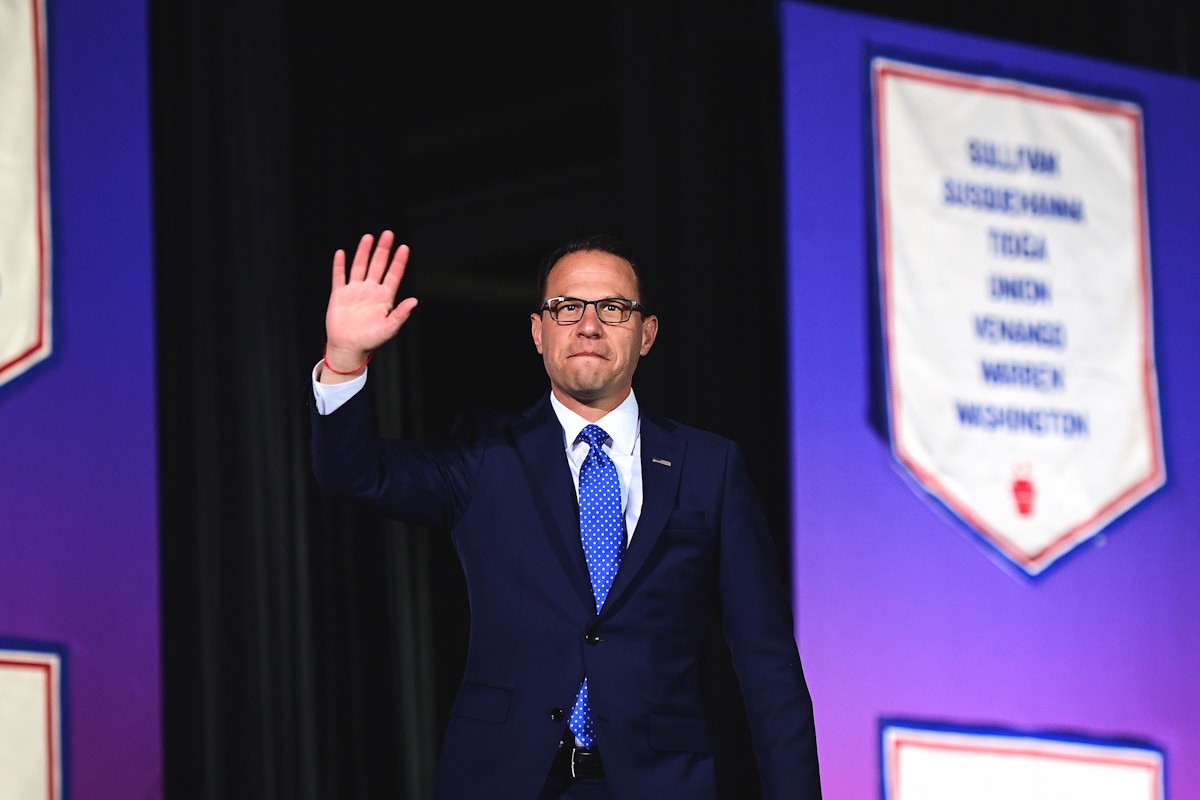
In 2007, when Josh Shapiro was a member of the Pennsylvania House of Representatives, the Democratic Party found itself in a bind. Shapiro had been in office for just two years, first elected in 2004 in an uphill battle for an open seat once held by his Republican opponent, a former member of Congress. Shapiro won by 10 percentage points, and his campaign became a model for centrist Democrats seeking to strengthen the party’s base in red parts of the state.
Although he was a newcomer, Shapiro quickly gained the respect of his Democratic colleagues. The party had just won control of the state House, but they had a one-seat majority and couldn’t agree on who should be speaker. That’s when Shapiro made a phone call.
On the other end of the line was Republican state Rep. Dennis O’Brien. Shapiro suggested a deal: O’Brien could become the Republican speaker for a Democrat-held chamber, and Shapiro would be the first-ever deputy speaker. The trade — a Democratic majority for Shapiro’s newly created leadership position — foretold the style of politics Shapiro would engage in over the next 15 years.
Since his win in Pennsylvania’s gubernatorial race last month, Gov.-elect Shapiro has packed his transition team with Republicans, lobbyists, wealthy donors, and corporate executives from companies like Comcast, Aramark, and Independence Blue Cross. But one member of Shapiro’s transition personnel committee stood out: Though Shapiro’s entire election strategy was that he was the anti-MAGA candidate, his team included James Schultz, a former associate White House counsel under President Donald Trump.
[TK quote critical of the pick]
Shapiro’s team, which declined to comment for this article, framed Schultz’s appointment as an effort by the incoming governor to encourage bipartisanship, building a broad tent and bringing people together in an extension of his campaign messaging. During the GOP primary, Shapiro spent ad money publicizing Republican candidate Doug Mastriano’s pro-Trump positions; Mastriano said he owed Shapiro a debt of gratitude. Then Shapiro undertook a strategy of waving his centrist banner and beat Mastriano by almost 15 percentage points in the general election.
Winning over Republicans that opposed Trump’s full-throated embrace of election denialism was a key part of the strategy, according to a memo released by the Shapiro campaign on Thursday. His campaign was backed by prominent Republicans, including Schultz, who defected from the GOP after Mastriano, an election denier, won the primary; Schultz said Mastriano would “damage the conservative mission.”
“Josh campaigned as a moderating voice, so it’s not surprising that he would surround himself with diverse perspectives,” said Ken Snyder, a Democratic strategist in Pennsylvania. “Jim worked for Trump, but also stood up to him by opposing his endorsed candidate Doug Mastriano. In today’s Republican Party that shows courage. It’s good that Josh would reward courage.”
After serving as a lawyer for Trump’s 2016 Republican National Convention and transition team, Schultz took his position as a White House attorney for much of Trump’s first year in office. As he was leaving office, he said his plan was always to do a short stint and that the controversies around Trump did not affect his decision.
In an interview at the time with Politico, Schultz defended the Trump White House, saying it was being unfairly maligned by critics lusting for power. “Some in the news media unfairly criticize this administration and take every opportunity to take shots, even when they’re not justified,” he said. “There have been folks out there trying to make a name for themselves in that space by being critics in order to set themselves up for other positions down the road.” He also praised Trump’s work reshaping the federal judiciary.
In the past, Schultz sometimes took a hard-line conservative tack. In 2013, when he was general counsel under former Republican Gov. Tom Corbett, Schultz wrote a brief opposing same-sex marriage that included a comparison of gay marriage to child marriage. The brief was widely denounced — including by Schultz’s boss at the time, Corbett, who disavowed the comparison after the fact, as well as Shapiro, who has long been vocal in support for the right to gay marriage.
Mark Segal, founder and publisher of Philadelphia Gay News, said he worked with Schultz on an affordable LGBTQ+ housing project under Corbett and considered him a friend. Segal said he later lobbied Corbett through Schultz to stand down on the gay marriage case. Asked about Schultz’s later work for Trump, Segal said, “I think right now we’ve all learned that Trump does not listen to his attorneys.”
Among fellow Democrats, Shapiro’s critics have long feared that his ascent would mean compromises with Republicans that put the party at risk by spurning the base that got him elected. They cited his support for everything from scholarships for alternatives to public educations that could bleed Philadelphia’s crumbling school district to his moderate positions on criminal justice reforms.
In the 2022 gubernatorial race, Schultz praised Shapiro for being “tough on crime” and opposing Larry Krasner, Philadelphia’s embattled progressive district attorney. Shapiro and Krasner have butted heads since the chief city prosecutor took office, though Shapiro has refused to comment on an unprecedented Republican-led effort to impeach Krasner.
This content originally appeared on The Intercept and was authored by Akela Lacy.
Akela Lacy | Radio Free (2022-12-10T11:00:24+00:00) Pennsylvania’s Governor-Elect Ran on Saving Democracy. Then He Appointed a Trump White House Lawyer.. Retrieved from https://www.radiofree.org/2022/12/10/pennsylvanias-governor-elect-ran-on-saving-democracy-then-he-appointed-a-trump-white-house-lawyer/
Please log in to upload a file.
There are no updates yet.
Click the Upload button above to add an update.